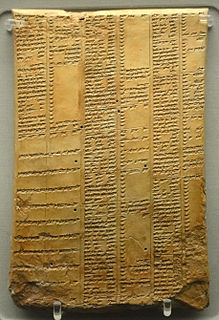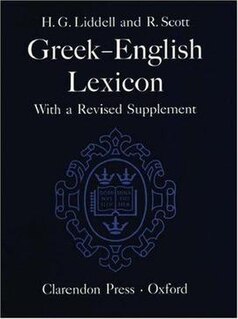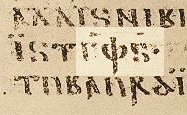
An encyclopedia, encyclopædia, or encyclopaedia is a reference work or compendium providing summaries of knowledge either general or special to a particular field or discipline. Encyclopedias are divided into articles or entries that are arranged alphabetically by article name or by thematic categories, or else are hyperlinked and searchable by random access. Encyclopedia entries are longer and more detailed than those in most dictionaries. Generally speaking, encyclopedia articles focus on factual information concerning the subject named in the article's title; this is unlike dictionary entries, which focus on linguistic information about words, such as their etymology, meaning, pronunciation, use, and grammatical forms.

A euphemism is an innocuous word or expression used in place of one that is deemed offensive or suggests something unpleasant. Some euphemisms are intended to amuse, while others use bland, inoffensive terms for concepts that the user wishes to downplay. Euphemisms may be used to mask profanity or refer to topics some consider taboo such as disability, sex, excretion, or death in a polite way.

An idiot, in modern use, is a stupid or foolish person.
Lexicology is the branch of linguistics that analyzes the lexicon of a specific language. A word is the smallest meaningful unit of a language that can stand on its own, and is made up of small components called morphemes and even smaller elements known as phonemes, or distinguishing sounds. Lexicology examines every feature of a word – including formation, spelling, origin, usage, and definition.
Semantics is the study of reference, meaning, or truth. The term can be used to refer to subfields of several distinct disciplines, including philosophy, linguistics and computer science.

An amphitheatre or amphitheater is an open-air venue used for entertainment, performances, and sports. The term derives from the ancient Greek ἀμφιθέατρον (amphitheatron), from ἀμφί (amphi), meaning "on both sides" or "around" and θέατρον (théātron), meaning "place for viewing".

A synonym is a word, or phrase that means exactly or nearly the same as another word, morpheme, or phrase in a given language. For example, in the English language, the words begin, start, commence, and initiate are all synonyms of one another: they are synonymous. The standard test for synonymy is substitution: one form can be replaced by another in a sentence without changing its meaning. Words are considered synonymous in only one particular sense: for example, long and extended in the context long time or extended time are synonymous, but long cannot be used in the phrase extended family. Synonyms with exactly the same meaning share a seme or denotational sememe, whereas those with inexactly similar meanings share a broader denotational or connotational sememe and thus overlap within a semantic field. The former are sometimes called cognitive synonyms and the latter, near-synonyms, plesionyms or poecilonyms.
A solecism is a phrase that transgresses the rules of grammar. The term is often used in the context of linguistic prescription; it also occurs descriptively in the context of a lack of idiomaticness.

A Greek–English Lexicon, often referred to as Liddell & Scott or Liddell–Scott–Jones (LSJ), is a standard lexicographical work of the Ancient Greek language originally edited by Henry George Liddell, Robert Scott, Henry Stuart Jones, and Roderick McKenzie and published in 1843 by the Oxford University Press.
Ancient Macedonian, the language of the ancient Macedonians, either a dialect of Ancient Greek, or a separate Hellenic language, was spoken in the kingdom of Macedonia during the 1st millennium BC and belongs to the Indo-European language family. It gradually fell out of use during the 4th century BC, marginalized by the use of Attic Greek by the Macedonian aristocracy, the Ancient Greek dialect that became the basis of Koine Greek, the lingua franca of the Hellenistic period.
A Latin Dictionary is a popular English-language lexicographical work of the Latin language, published by Harper and Brothers of New York in 1879 and printed simultaneously in the United Kingdom by Oxford University Press.
In morphology and lexicography, a lemma is the canonical form, dictionary form, or citation form of a set of words. In English, for example, break, breaks, broke, broken and breaking are forms of the same lexeme, with break as the lemma by which they are indexed. Lexeme, in this context, refers to the set of all the inflected or alternating forms in the paradigm of a single word, and lemma refers to the particular form that is chosen by convention to represent the lexeme. Lemmas have special significance in highly inflected languages such as Arabic, Turkish and Russian. The process of determining the lemma for a given word is called lemmatisation. The lemma can be viewed as the chief of the principal parts, although lemmatisation is at least partly arbitrary.
Irregardless is a word sometimes used in place of regardless or irrespective, which has caused controversy since the early twentieth century, though the word appeared in print as early as 1795.

Geoffrey Stephen Kirk, was a British classicist who served as the 35th Regius Professor of Greek at the University of Cambridge. He published widely on pre-Socratic philosophy and the work of the Greek poet Homer, culminating in a six-volume philological commentary on the Iliad published between 1985 and 1993.

The English word god comes from the Old English god, which itself is derived from the Proto-Germanic *ǥuđán. Its cognates in other Germanic languages include guþ, gudis, guð, god, and got.
A character is a semiotic sign or symbol, or a glyph – typically a letter, a numerical digit, an ideogram, a hieroglyph, a punctuation mark or another typographic mark.

A scholarch was the head of a school in ancient Greece. The term is especially remembered for its use to mean the heads of schools of philosophy, such as the Platonic Academy in ancient Athens. Its first scholarch was Plato himself, the founder and proprietor. He held the position for forty years, appointing his nephew Speusippus as his successor. The members of the Academy elected later scholarchs.
James Diggle, is a British classical scholar. He was Professor of Greek and Latin at the University of Cambridge between 1995 and 2011.
The following tables compare Ancient Greek dictionaries, in any language.
Neil Hopkinson was an English Hellenist. Educated at Peterhouse, Cambridge, he served as a fellow and director of studies in Classics at Trinity College, Cambridge from 1983 until his death in 2021. He has been described as "one of the most influential commentators of his generation".







